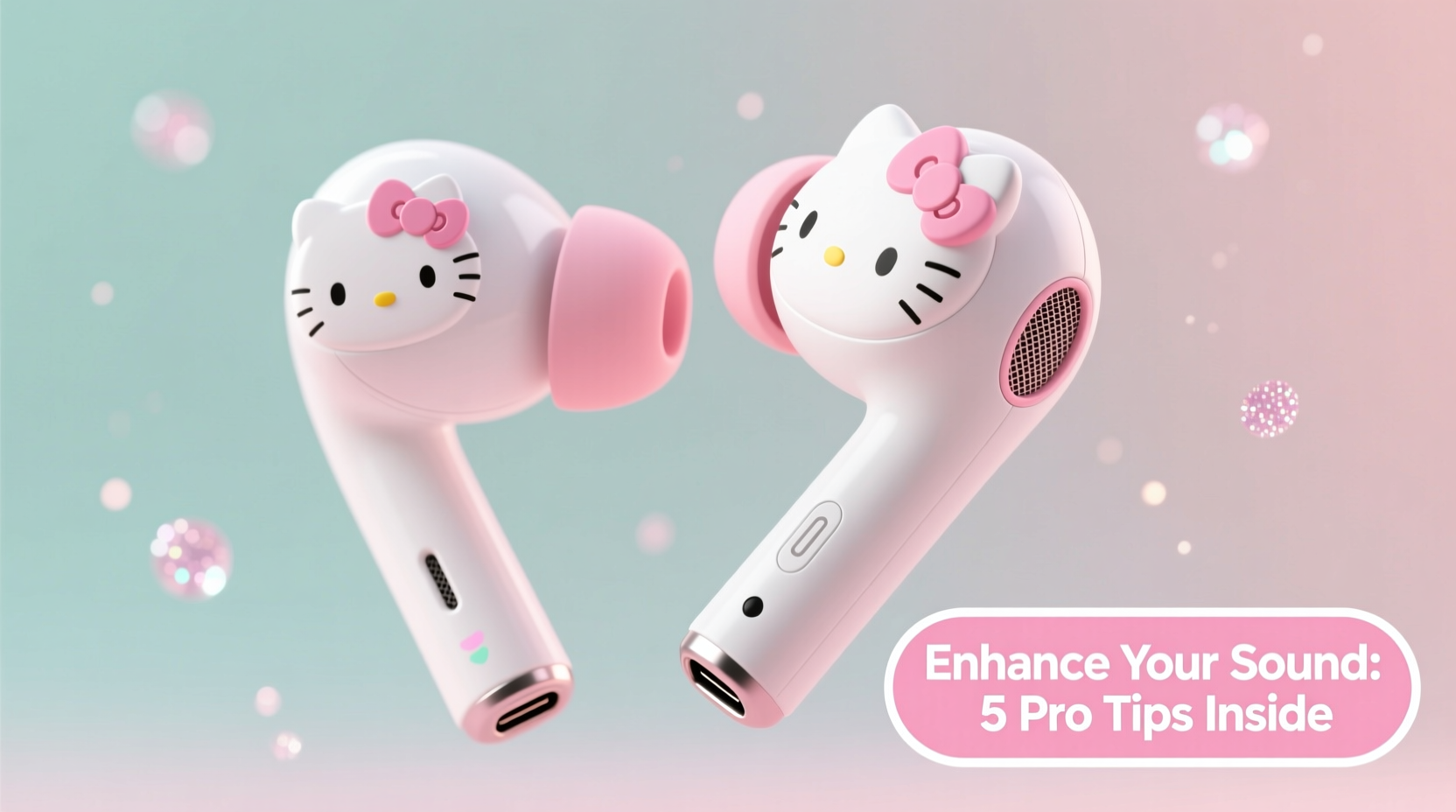Hello Kitty earphones are beloved for their charming design and accessibility, especially among younger listeners and fans of kawaii culture. While they deliver decent audio out of the box, many users overlook simple yet powerful ways to improve their sound performance. With a few strategic adjustments—ranging from proper fit to software tuning—it’s possible to unlock clearer highs, deeper bass, and more balanced audio. This guide dives into practical, tested methods to help you get the most out of your Hello Kitty earphones without upgrading hardware.
1. Ensure a Secure and Proper Fit

The way earphones sit in your ears has a direct impact on sound quality. A poor seal leads to sound leakage, reduced bass response, and increased ambient noise, forcing you to raise the volume unnecessarily. Hello Kitty earphones typically come with standard silicone tips, which may not suit all ear shapes.
To optimize fit:
- Experiment with different ear tip sizes. Most models include small, medium, and large options—try each to find the one that creates a snug but comfortable seal.
- Consider upgrading to foam or memory silicone tips, which conform better to the ear canal and improve noise isolation.
- Insert the earphones gently at a slight forward angle to align with your ear canal’s natural curve.
2. Keep Your Earphones Clean
Dust, earwax, and debris can accumulate on the speaker mesh over time, muffling sound and distorting clarity. Regular cleaning is essential for maintaining peak audio performance.
Follow this gentle cleaning routine:
- Power off and disconnect the earphones.
- Use a dry, soft-bristled brush (like a clean toothbrush) to remove surface particles from the earbud nozzle.
- For stubborn buildup, lightly dampen a cotton swab with rubbing alcohol, wipe the exterior, and let it air-dry completely before use.
- Avoid inserting anything into the mesh to prevent damaging the internal driver.
“Even minor blockages can degrade high-frequency response by up to 30%. Keeping drivers clean preserves tonal balance.” — Dr. Lena Torres, Audio Acoustics Researcher, Institute of Sound Engineering
3. Optimize Source and Playback Settings
The device you're using plays a crucial role in sound output. Even high-quality earphones can underperform when paired with poorly configured sources.
Key adjustments to make:
- Use high-bitrate audio files (e.g., FLAC, ALAC, or 320kbps MP3) instead of low-quality streams when possible.
- Disable audio compression features like “Dynamic Range Compression” on smartphones, which flatten sound dynamics.
- Turn off unnecessary sound enhancement modes (e.g., “Bass Boost” or “Surround”) that distort the original mix.
- Ensure your device’s volume is set to 75–85%, then fine-tune using the source app to avoid digital clipping.
| Setting | Action | Benefit |
|---|---|---|
| Audio Format | Use lossless or high-bitrate files | Preserves detail and dynamic range |
| EQ Preset | Select “Flat” or “Off” | Delivers neutral, accurate sound |
| Noise Cancellation | Use only in noisy environments | Prevents artificial sound processing |
| Volume Balance | Check left/right balance settings | Ensures even stereo imaging |
4. Use an External DAC or Equalizer
Many budget-friendly devices have built-in audio chips that compromise sound fidelity. A Digital-to-Analog Converter (DAC) or a software equalizer can dramatically improve clarity and depth.
For mobile users:
- Use apps like Wavelet (Android) or Equalizer FX (iOS) to apply custom EQ profiles tailored to small drivers.
- Look for presets designed for “neutral” or “balanced” response, then adjust based on personal preference.
For computer or tablet use:
- Connect via a USB-C or Lightning DAC dongle (e.g., FiiO KA1 or Apple USB-C to 3.5mm adapter).
- These external DACs bypass low-quality internal audio circuitry, delivering cleaner signal output.
5. Real-World Example: Improving a Teen Listener’s Experience
Maria, a 16-year-old student and avid Hello Kitty fan, found her earphones lacking in bass and often muffled during online classes and music sessions. She used them daily with her smartphone, often at maximum volume, leading to ear fatigue.
After implementing these steps:
- She replaced the default ear tips with Comply foam tips for better seal.
- She cleaned the earbuds weekly and disabled the phone’s “Vivid Audio” enhancement.
- She installed Wavelet and applied a flat EQ with a +3dB boost at 120Hz and -2dB at 8kHz to reduce shrillness.
The result? Maria reported clearer dialogue in videos, improved music enjoyment, and was able to lower her listening volume by 20%, reducing strain. Her earphones felt like a new pair—without spending extra.
Essential Optimization Checklist
Follow this checklist monthly to maintain optimal sound quality:
- ✅ Inspect and clean earphone nozzles
- ✅ Test ear tip seal and comfort
- ✅ Verify audio source quality (file format, streaming service)
- ✅ Reset EQ settings to neutral before adjusting
- ✅ Check cable or connector for damage (if wired)
- ✅ Update device OS and audio apps
- ✅ Store earphones in a protective case away from heat and moisture
Frequently Asked Questions
Can I use Bluetooth adapters to improve wireless sound quality?
Yes. If your Hello Kitty earphones are wired but your device lacks a headphone jack, use a high-quality Bluetooth transmitter with support for aptX or LDAC codecs. These preserve more audio data during wireless transmission compared to standard SBC encoding.
Why does one earbud sound quieter than the other?
This is often due to wax buildup on the quieter side or an imbalance in your device’s audio settings. First, clean the earbud thoroughly. Then, go to Accessibility settings and check if the left/right volume balance is centered. If the issue persists, test the earphones on another device to isolate the problem.
Do expensive audio cables make a difference?
For most consumer-grade earphones like Hello Kitty models, aftermarket cables rarely improve sound unless the original cable is damaged. Focus on fit, source quality, and software tuning instead—these offer far greater returns on investment.
Conclusion: Maximize Joy, One Note at a Time
Your Hello Kitty earphones are more than just a fashion statement—they’re a gateway to music, podcasts, and connection. With thoughtful care and smart tweaks, you can transform their audio performance from average to exceptional. Whether you're reliving childhood nostalgia or expressing your playful style, there's no reason to compromise on sound.









 浙公网安备
33010002000092号
浙公网安备
33010002000092号 浙B2-20120091-4
浙B2-20120091-4
Comments
No comments yet. Why don't you start the discussion?